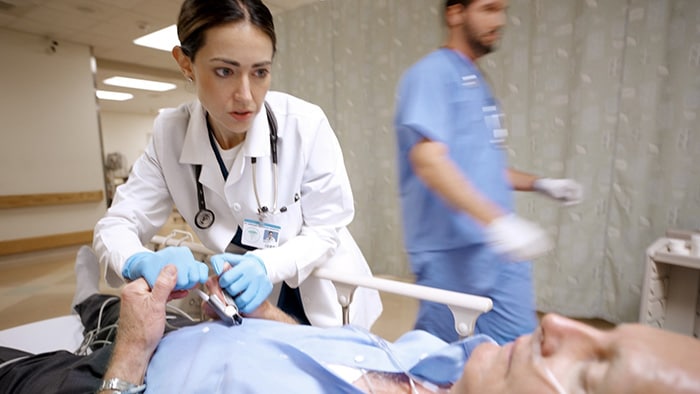Om te innoveren heb je creativiteit en vakkennis nodig. Maar om impact te maken op de langere termijn is innovatie vooral een kwestie van heel goed plannen.
"Voor de buitenwereld lijken innovaties snel te gaan. Dat is ook zo, maar nieuwe producten worden natuurlijk niet van de ene op de andere dag ontwikkeld. Achter een productintroductie gaat soms wel tien jaar aan voorbereiding schuil."
Franklin Schuling is als lid van de supervisory board van e/MTIC en Innovation Program Manager Connected Care in Philips Research verantwoordelijk voor de meerjarenplanning van innovaties op het gebied van Connected Care-oplossingen. Hij heeft een heel duidelijk beeld voor ogen hoe de toekomst van innovatie in de gezondheidszorg eruitziet: in partnerships, met open data.
Samenwerking
In zijn carrière heeft Franklin bij veel verschillende afdelingen van Philips gewerkt; zo hield hij zich in de jaren negentig bezig met de ontwikkeling van röntgensystemen in Best. Later leidde hij enkele jaren Philips Research in de VS.
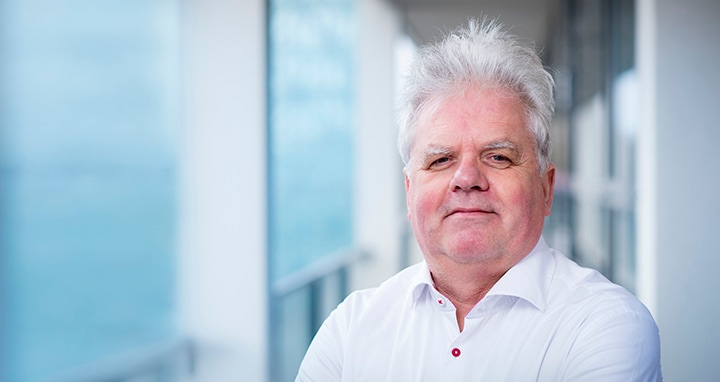
Een belangrijk moment in zijn carrière diende zich kort na de eeuwwisseling aan. "We waren toen steeds meer aan het specialiseren in gezondheidstechnologie. In research is het heel belangrijk om daarin nauw samen te werken met de klinische praktijk. Wat mij toen opviel, was dat we voor elk onderzoeksproject de samenwerking opnieuw moesten opzetten, en opnieuw afspraken moesten maken over onder meer voorwaarden en tarieven."
Als Philips wilde groeien in gezondheidstechnologie, dan zou het steeds belangrijker worden om de samenwerking met ziekenhuizen structureler in te richten, zo beredeneerde Franklin. "Ik sprak daarover met collega Ton Flaman, die eenzelfde ervaring had met de samenwerking met TU/e op het gebied van gezamenlijke PhD-projecten."
De geboorte van e/MTIC
De gezamenlijke ervaring leidde uiteindelijk tot de geboorte van e/MTIC, een structurele samenwerking tussen Philips, TU/e en drie topklinische zorgorganisaties in de regio - Maxima Medisch Centrum, Catharina Ziekenhuis en Kempenhaeghe.
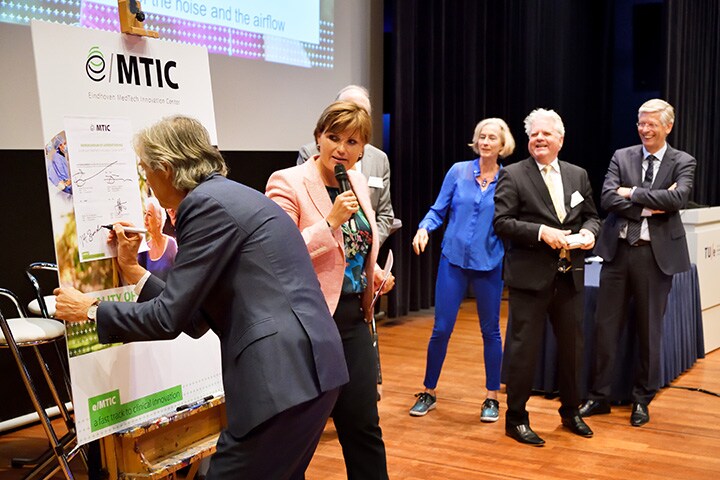
Partnerships zijn onmisbaar in de research naar nieuwe technologieën, aldus Franklin: “Dat valt nauwelijks te onderschatten. De medische wereld is complex. Als je een nieuwe technologie ontwikkelt, moet je dat altijd doen vanuit de vraag in de klinische praktijk. Dat klinkt misschien vanzelfsprekend, maar dat is behoorlijk ingewikkeld. Je moet eerst op zoek naar wat we ook wel een burning platform noemen; wat is een probleem waar een bepaalde arts, verplegend personeel, een afdeling of de bestuurder van het ziekenhuis mee te maken heeft? En dan ga je pas kijken hoe je dat op een innovatieve manier kunt oplossen. Dat kan veel beter als je structureel samenwerkt met een universiteit en ziekenhuizen."
Als je een nieuwe technologie ontwikkelt, moet je dat altijd doen vanuit de vraag in de klinische praktijk. Dat klinkt misschien vanzelfsprekend, maar dat is behoorlijk ingewikkeld.
Franklin Schuling
Innovation Program Manager
MIT
Dezelfde exercitie heeft hij niet alleen in de Brainport-regio gedaan, maar ook in de VS: "Vanuit de research-hub in Cambridge hebben we een ecosysteem opgezet met een aantal ziekenhuizen en universiteiten in de Boston metropoolregio. We wilden gezamenlijk zorgen voor toegang tot research-talent en klinische experts."
Of het nu gaat om Cambridge, Massachusetts, of Eindhoven Brainport, de voordelen van samenwerking tussen ziekenhuizen, universiteit en een medisch technologiebedrijf zijn overal hetzelfde, betoogt Franklin. "We hebben top-PhD-kandidaten binnengehaald die echt afkwamen op dat partnership.”
“Er is onderzoek gedaan naar innovaties die zonder e/MTIC niet mogelijk waren geweest. Denk bijvoorbeeld aan de Healthdot, de draagbare sensor voor patiënten thuis die we onlangs hebben geïntroduceerd. Die is in nauwe samenwerking met het Catharina Ziekenhuis ontwikkeld, dat samen met ons de validatie heeft gedaan met een groep van 350 patiënten."
Dataset van 1.300 insomniapatiënten
"Met slaapexertisecentrum Kempenhaeghe hebben we een dataset opgebouwd van 1.300 insomniapatiënten op het gebied van polisomnografie - oftewel het slaappatroon. Deze dataset helpt ons enorm met het verbeteren van de diagnostisering en de effectiviteit van onze slaapproducten.”
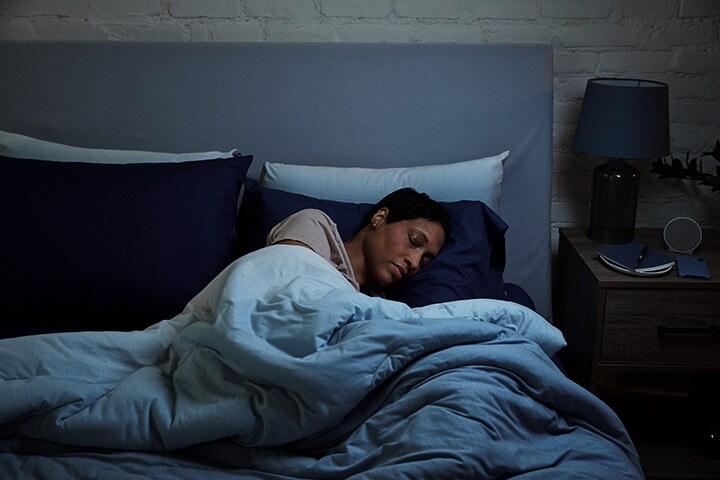
In de toekomst gaat het belangrijker worden om data ook beschikbaar te stellen aan externe partijen, aldus Franklin: "Eigenlijk heeft e/MTIC ons geleerd dat een structureel partnership alle partijen een voordeel geeft. Je maakt één keer afspraken over de samenwerking, zet samen de schouders eronder en iedereen profiteert daarvan. Die blauwdruk kun je ook gebruiken voor het openstellen van data."
Eigenlijk heeft e/MTIC ons geleerd dat een structureel partnership alle partijen een voordeel geeft. Je maakt één keer afspraken over de samenwerking, zet samen de schouders eronder en iedereen profiteert daarvan. Die blauwdruk kun je ook gebruiken voor het openstellen van data.
Franklin Schuling
Innovation Program Manager
"Voor research is data nu belangrijker dan ooit, en dat gaat alleen nog maar toenemen. Een partnerschap als e/MTIC, waarin een universiteit, gezondheidstechnologiebedrijf en ziekenhuizen samenwerken, is een hele logische organisatie om zogeheten data te verzamelen en beschikbaar te stellen."
Als lid van de supervisory board heeft Franklin de missie om deze ambitie met e/MTIC waar te maken. "Ik geloof echt dat we daarmee een positieve impact kunnen maken op de toekomst van innovatie op het gebied van gezondheidstechnologie."
Oncologie en eerstelijnszorg
Zijn er nog meer mogelijkheden om een grotere impact te maken met e/MTIC? "Op veel fronten. We hebben goed werk verricht, met name op het gebied van cardiologie. Maar er zit ook echt nog wel groeipotentie, bijvoorbeeld door ons meer te richten op andere onderwerpen, zoals oncologie en de eerstelijnszorg."
"De zorg is nu in rap tempo aan het digitaliseren. Ik geloof dat we met e/MTIC een belangrijke bijdrage kunnen leveren aan deze transitie, die de druk op de zorg voor een deel kan wegnemen."
De zorg is nu in rap tempo aan het digitaliseren. Ik geloof dat we met e/MTIC een belangrijke bijdrage kunnen leveren aan deze transitie, die de druk op de zorg voor een deel kan wegnemen.
Franklin Schuling
Innovation Program Manager
Ook dat is weer een kwestie van jaren vooruitkijken; "Het ziekenhuis van de toekomst, noem het Hospital 4.0, is voor een belangrijk deel digitaal. Met e/MTIC hebben we het perfecte platform om die digitale transformatie mee vorm te geven."
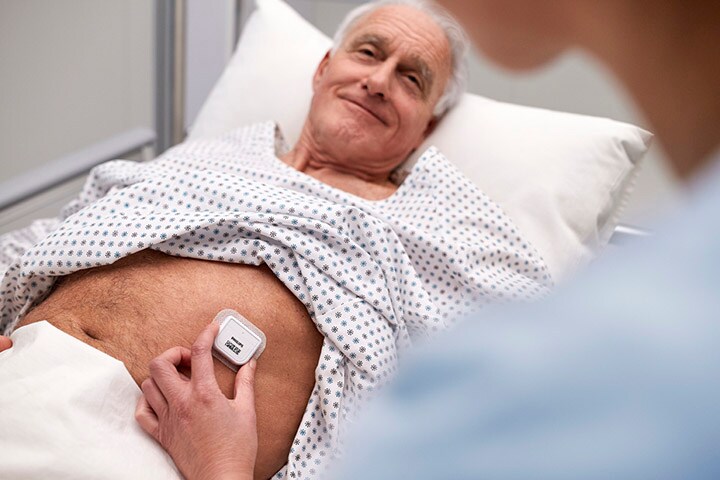
"With e/MTIC, we have the perfect partnership to shape the digital transformation of healthcare."
In order to innovate, you need creativity and expertise. But to make an impact in the longer term, innovation is mainly a matter of very good planning.
"To the outside world, innovations seem to move quickly. That is true, but new products are of course not developed overnight. A product introduction may sometimes hide ten years of preparation."
As a member of the supervisory board of e/MTIC and Innovation Program Manager Connected Care at Philips Research, Franklin Schuling is responsible for the multi-year planning of innovations in Connected Care solutions. He has a very clear picture of what the future of innovation in healthcare looks like: in partnerships, with open data.
Collaboration
In his career, Franklin has worked in many different departments of Philips; for example, in the 1990s he was involved in the development of X-ray systems in Best. Later he headed Philips Research in the US for several years.

An important moment in his career came shortly after the turn of the century. "At that time, we were increasingly specializing in health technology. In research it is very important to work closely with clinical practice. What struck me at the time was that we had to set up the collaboration again for each research project, and make new agreements about conditions and rates, among other things."
If Philips wanted to grow in health technology, it would become increasingly important to structure cooperation with hospitals in a more structured way, Franklin argued. "I spoke to my colleague Ton Flaman about this, who had the same experience with the collaboration with TU/e in the field of joint PhD projects."
The birth of e / MTIC
The joint experience eventually led to the birth of e/MTIC, a structural collaboration between Philips, TU/e and three top clinical care organizations in the region - Máxima Medical Center, Catharina Hospital and Kempenhaeghe.

The collaboration has a major impact on the way in which Philips researches new technologies. “That is almost impossible to underestimate,” says Franklin. "The medical world is complex. When you develop a new technology, you always have to do it based on the demand in clinical practice. That may sound obvious, but it is in fact quite complicated. You first have to look for what we call a burning platform; what is a problem that a particular doctor, the nursing staff, a department or the manager of the hospital has to deal with? That is when you start to look at how you can solve it in an innovative way. This can be done much better if you structurally collaborate with hospitals and universities.
When you develop a new technology, you always have to do it based on the demand in clinical practice. That may sound obvious, but it is quite complicated.
Franklin Schuling
Innovation Program Manager
MIT
Not only has he done this very same exercise in the Brainport region, but also in the US: "From the research hub in Cambridge, we have set up an ecosystem with a number of hospitals and universities in the Boston metropolitan region. We wanted to jointly provide access to research talent and clinical experts."
Whether it's Cambridge, Massachusetts, or Eindhoven Brainport, the benefits of collaboration between hospitals, universities and a medical technology company are the same everywhere, argues Franklin. "We brought in top PhD candidates who were really drawn to that partnership. Research has been done into innovations that would not have been possible without e/MTIC. The Healthdot, for example, a wearable sensor for patients at home, has been developed in close collaboration with the Catharina Hospital. Together with us, they did the validation with a group of 350 patients."
Dataset of 1,300 insomnia patients
"With Kempenhaeghe, the center for sleep medicine, we have built a dataset of 1,300 insomnia patients in the field of polisomnography - or sleep pattern. This dataset helps us enormously in improving the diagnostics and effectiveness of our sleep products."

In the future, it will become more important to also make data available to external parties, according to Franklin: "If anything, e/MTIC has taught us that a structural partnership gives all involved parties an advantage. You make agreements about the collaboration once, put your shoulders to the wheel and everyone benefits from it. That blueprint can also be used to open up data."
If anything, e/MTIC has taught us that a structural partnership gives all involved parties an advantage. You make agreements about the collaboration once, put your shoulders to the wheel and everyone benefits from it. That blueprint can also be used to open up data.
Franklin Schuling
Innovation Program Manager
"For research, data is more important than ever these days, and it is only going to increase. A partnership like e/MTIC, in which a university, health technology company and hospitals work together, is a very logical organization to collect so-called data and make it available."
As a member of the supervisory board, Franklin is on a mission to fulfill this ambition with e/MTIC. "I really believe that we can make a positive impact on the future of innovation in health technology."
Oncology and Primary Care
Are there even more possibilities to make a bigger impact with e/MTIC? "On many fronts ee have done a good job, especially in the field of cardiology. But there still is a lot of potential to grow, for example by focusing more on other topics, such as oncology and primary care."
"Nowadays, healthcare is rapidly digitizing. I believe that with e/MTIC we can make an important contribution to this transition, which can partly take the pressure off healthcare."
Nowadays, healthcare is rapidly digitizing. I believe that with e/MTIC we can make an important contribution to this transition, which can partly take the pressure off healthcare.
Franklin Schuling
Innovation Program Manager
That too is a matter of looking years ahead; "The hospital of the future, call it Hospital 4.0, is largely digital. With e/MTIC we have the perfect platform to help shape this digital transformation."









